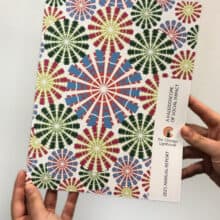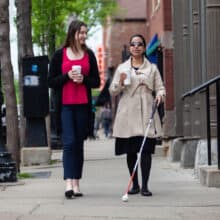The Joy of Reading
Literature is my Utopia. Here I am not disenfranchised. No barrier of the senses shuts me out from the sweet, gracious discourses of my book friends. They talk to me without embarrassment or awkwardness.
– Helen Keller, The Story of My Life
One of the main areas in which people who are blind or have a visual impairment suffer, particularly if they have lost their vision at a later age, is the loss of their ability to read. Suddenly being unable to read mail, books, magazines, restaurant menus and product labels, to name just a few areas, means a loss of independence and a subsequent decline in quality of life. Often people will turn to their family and friends for help; however having to rely on others is unsatisfactory to many people and the psychological burden further leads to a decline in quality of life. If a student experiences vision loss, being unable to access textbooks or see the whiteboard can put them at a disadvantage to their peers and lead to a loss of motivation in school and poor grades. Being able therefore to propose viable techniques that can enhance the ability of a person who is blind or visually impaired to read is very important, and thankfully there are many devices that can be utilized.
Electronic magnification is a huge area and consists of devices from handheld to desktop and every size in between. Using an electronic magnifier or CCTV a user can read anything from a menu or food label to a book much more easily than with a regular magnifying glass.
If magnification doesn’t work for you then OCR may be the answer. OCR or read aloud devices can take a picture of a piece of text and read it aloud to a user. Great for reading mail or books these devices can do wonders for your independence.
As well as these there are many services available providing audio books. The Library of Congress runs a program called BARD offering free audio books and a device to play them to people with a visual impairment. You can apply at nlsbard.loc.gov or visit your local library. In addition, services such as bookshare.org and learning ally offer access to many books including textbooks for students. As well as these, through a tablet, e-reader or phone it is possible to download thousands of books from places such as Amazon or the Apple App Store.
Reading as a person who is blind or visually impaired is a huge topic and can’t be covered in a blog post. For more information you can contact us at (312) 997-3649, email Luke or visit our Youtube Channel.





